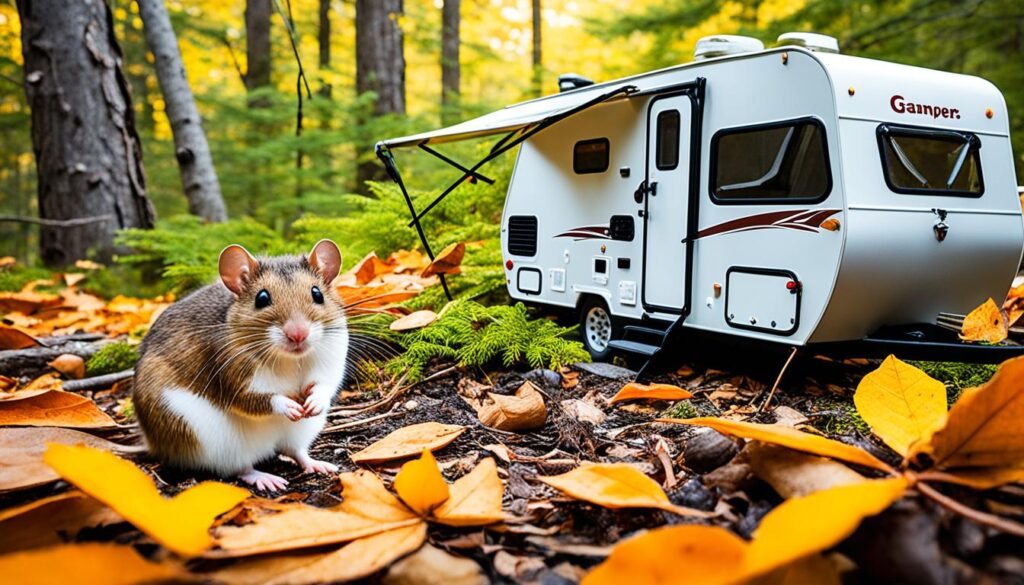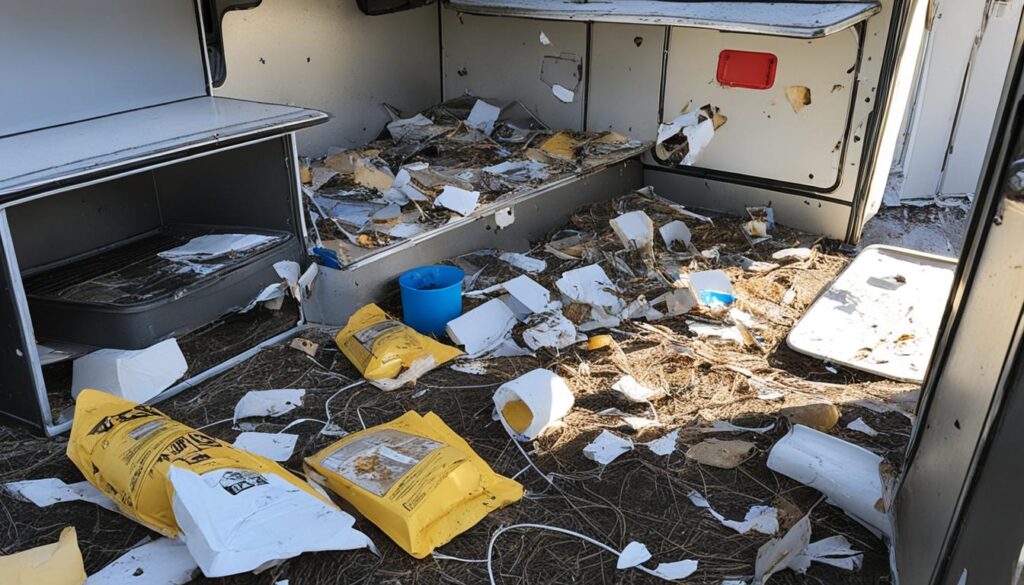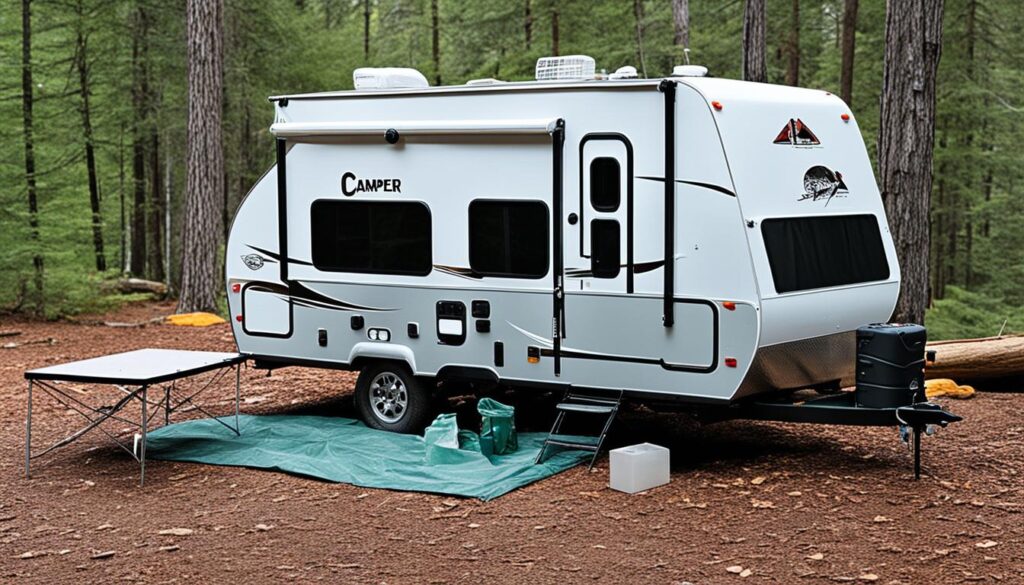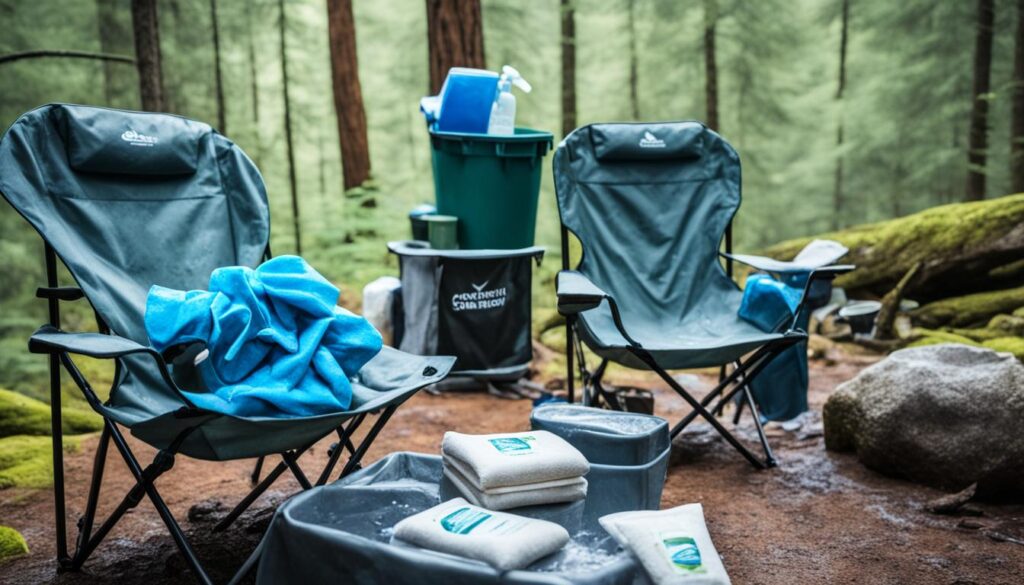Are you tired of finding chewed wires and gnawed plumbing in your camper? Worried about the health risks associated with mice infestations? If you’re wondering how to keep mice out of your camper and prevent costly damage, you’re in the right place.
Mice can cause havoc in your camper by chewing through important wiring and plumbing systems. They can also spread diseases, posing a risk to you and your loved ones. That’s why it’s crucial to take proactive measures to keep them out.
In this article, I will share practical tips and strategies to help you rodent-proof your camper and prevent mice infestations. From understanding why mice target campers to identifying the signs of an infestation, you’ll learn how to create a mouse-free environment for your camping adventures.
Key Takeaways
- Understanding why mice are attracted to campers can help you implement effective prevention strategies.
- Recognizing the signs of a mouse infestation early is essential for prompt action.
- Thoroughly inspecting and sealing potential entry points in your camper is crucial to keep mice out.
- Using natural deterrents and electronic repellents can further enhance your camper’s defense against mice.
- Maintaining cleanliness and a mouse-proof environment is key to preventing mice infestations.
Contents
Why Mice Target Campers
Mice are naturally drawn to campers due to various factors that make them appealing to these rodents. Understanding the reasons behind mice targeting campers is crucial in formulating effective strategies to prevent infestations and protect your camper.
One primary reason mice target campers is the warm and safe environment they provide. During colder seasons, mice seek shelter from harsh weather conditions, and campers offer cozy interiors that can keep them protected and comfortable.
Moreover, campers often contain an abundance of food sources, making them an attractive destination for hungry mice. Leftover crumbs, unsealed food containers, and even pet food left out can serve as a buffet for these pests.
Once inside a camper, mice can cause significant damage. They have a natural tendency to chew on various materials, including wiring and plumbing systems. This destructive behavior not only compromises the functionality of your camper but also poses potential safety hazards such as electrical failures and water leaks.
Mice also utilize materials found within the camper to build nests. They can tear apart insulation, fabric, and even paper products to construct cozy homes for their offspring. These nests are often hidden in hard-to-reach areas, exacerbating the difficulty of eradicating an infestation.
Another concern when it comes to mice targeting campers is the potential spread of diseases. Mice can carry pathogens such as Hantavirus and Salmonella, which can be transmitted to humans through contact with their droppings, urine, or saliva. This poses a health risk to campers and their families.
By understanding the reasons behind mice targeting campers, you can take proactive measures to deter these pests and protect your camper from infestations. Implementing strategies such as regular inspections, sealing potential entry points, proper food storage, and maintaining cleanliness can go a long way in keeping mice out of your camper and ensuring a safe and enjoyable camping experience.

| Reasons Why Mice Target Campers |
|---|
| Warm and safe environment |
| Abundance of food sources |
| Potential damage to wiring and plumbing systems |
| Utilization of camper materials for nest construction |
| Potential spread of diseases |
Signs of a Mouse Infestation
Detecting a mouse infestation early is crucial to prevent extensive damage and potential health risks. By being vigilant and knowing the signs of a mouse infestation, you can take prompt action to address the issue and minimize any further damage to your camper.
Here are some common indications of a mouse infestation:
- Droppings: Mouse droppings resemble small black grains of rice and are often found near food sources or nesting areas. If you come across droppings in your camper, it is a strong sign that mice have been present.
- Gnaw marks: Mice have sharp incisor teeth that continuously grow, leading them to gnaw on various materials, including wires, insulation, and furniture. Look for chewed-up materials or visible gnaw marks on surfaces within your camper.
- Strange noises: Mice are nocturnal creatures and are most active during the night. If you hear scratching, scampering, or squeaking sounds within the walls or ceiling of your camper, there is a chance that mice have taken up residence.
- Musky odor: Mice can produce a distinct musky smell that can be particularly noticeable in enclosed spaces, such as closets or cabinets.
Regularly inspecting your camper for these signs will help you identify a potential mouse infestation early on. If you notice any of these indications, it is important to take immediate action to prevent further damage and health risks.

Inspecting and Sealing Your RV Camper
Thoroughly inspecting and sealing potential entry points in your camper is crucial when it comes to keeping mice out. These resilient rodents can squeeze through small holes, so it’s essential to conduct a comprehensive examination both inside and outside of your RV. By focusing on common entry points such as areas where wires, pipes, or other conduits pass through the design, you can effectively prevent mice from entering your camper.
During the inspection process, pay close attention to any cracks, gaps, or openings that could serve as pathways for mice. Use your hands to feel for any drafts or unusual airflow, as this could indicate a potential entry point. Additionally, take note of any signs of gnawing or scratching marks around these areas, which could be evidence of existing mouse activity.
Once you have identified the potential entry points, it’s time to seal them up. There are several materials you can use for this purpose, including spray foam, caulk, and steel wool. These materials provide a physical barrier that mice cannot easily penetrate, effectively preventing them from entering your camper.
When applying these sealing materials, be thorough and meticulous. Ensure that you cover all the identified entry points, paying attention to both the interior and exterior of your RV. Remember, mice are resourceful and can find their way through the smallest gaps, so make sure your sealing is airtight.
By diligently inspecting and sealing your RV camper, you can create a barrier that prevents mice from entering through potential openings. Taking these proactive measures will greatly reduce the risk of a mouse infestation and help protect your camper from potential damage.
Deterrents and Repellents
To enhance your efforts in keeping mice out of your camper, incorporating deterrents and repellents can be highly effective. There are various options available, including both natural and electronic methods.
Natural deterrents have been known to repel mice successfully. Peppermint oil-soaked cotton balls strategically placed in areas where mice are likely to enter can help deter them. The strong scent of peppermint is unpleasant to mice, making them think twice about venturing inside. Another natural option is using dryer sheets, which mice find irritating due to the texture and scent. By placing dryer sheets in potential entry points or areas of infestation, you can deter these unwanted guests. Additionally, Fresh Cab pouches, made with botanical ingredients that emit natural scents disliked by mice, are also effective in keeping them away from your camper.
Electronic repellents offer a more advanced solution for mice control in camping. Plug-in devices emit ultrasonic frequencies that are unpleasant to mice, effectively deterring them from entering your camper. These devices are easy to use and can cover a larger area. For an eco-friendly option, you can opt for solar-powered electronic repellents, which utilize solar energy to generate the required frequencies. These repellents provide a continuous and hassle-free deterrent against mice, allowing you to enjoy your camping experience with peace of mind.
By combining natural deterrents and electronic repellents, you can create a multi-layered defense system to keep mice out of your camper. Implementing these methods alongside other preventive measures, such as sealing entry points and maintaining a clean environment, will significantly reduce the risk of mice infestations during your camping trips.
FAQ
What are some effective ways to keep mice out of my camper?
To keep mice out of your camper, you can implement strategies such as inspecting and sealing potential entry points, using deterrents and repellents, and maintaining a clean and mouse-proof environment. Thoroughly inspecting and sealing entry points, using natural deterrents like peppermint oil-soaked cotton balls or dryer sheets, and employing electronic repellents are effective methods.
Why are mice attracted to campers?
Mice are attracted to campers because they offer a warm and safe environment with an abundance of food and shelter. Once inside, mice can cause damage to wiring and plumbing systems and build nests using camper materials. Additionally, mice can spread diseases, posing a health risk.
What are the signs of a mouse infestation in my camper?
Common signs of a mouse infestation include droppings, gnaw marks, strange noises, and a musky odor. Regularly inspecting your camper for these signs will help in addressing a mouse infestation promptly and minimizing potential damage.
How can I inspect and seal my RV camper to prevent mice entry?
Thoroughly inspect both the exterior and interior of your camper for potential entry points, paying particular attention to areas where wires, pipes, or other conduits pass through the RV’s design. Sealing these entry points using materials like spray foam, caulk, or steel wool will help create a barrier against mice.
What are some effective deterrents and repellents to keep mice away from my camper?
Natural options such as peppermint oil-soaked cotton balls, dryer sheets, and Fresh Cab pouches can be effective in repelling mice from your camper. Electronic repellents, including plug-in and solar-powered devices that emit frequencies unpleasant to mice, can also be used. The combined use of these methods can create a multi-layered defense against mice infestations in your camper.






